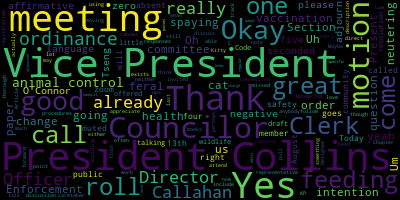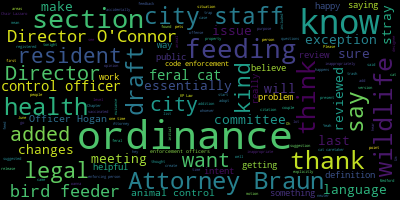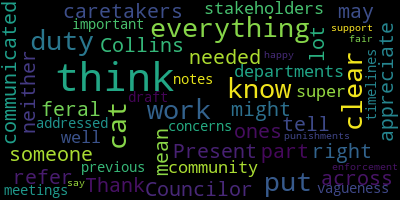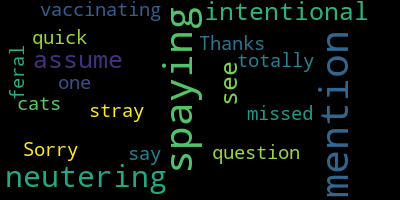total time: 4.34 minutes
total words: 546

total time: 17.16 minutes
total words: 2836

total time: 0.01 minutes
total words: 1

total time: 0.93 minutes
total words: 143

total time: 0.27 minutes
total words: 53

[SPEAKER_06]: Yeah, we're having a great conversation right now. Tomorrow we're going to have this conversation.
[Emily Lazzaro]: Oh, there it goes. Okay. Um, thank you. Oh, was I muted? Okay. That's great. All right. Uh, this meeting will come to order. This is the public health and community safety committee, August 13th, 2024. Um, uh, clerk, can you call the roll? We have one member on zoom.
[Adam Hurtubise]: Yes. Councilor Callahan said she's on her way. Vice President Collins?
[Kit Collins]: Present.
[Adam Hurtubise]: Councilor Leming?
[Matt Leming]: Present.
[Adam Hurtubise]: Councilor Tseng?
[Justin Tseng]: Present.
[Adam Hurtubise]: Chair Lazzaro?
[Emily Lazzaro]: Present. That is four present, one absent, and this meeting is called to order. Today we are talking about 23-449 offered by Vice President Collins, resolution to draft wildlife feeding ordinance. This paper has been in this committee for a little while and The Health Director, Animal Control Officer, Code Enforcement Officers, and a representative of KP Law are invited to attend this meeting. And Vice President Collins, if you would like to talk about where we have come since our last meeting and where we're going now and what we still have to discuss.
[Kit Collins]: Sure, thank you, Chair Lazzaro. So I, again, wanna thank the Board of Health Director, Director O'Connor, and Officer Hogan, as well as the Code Enforcement Officers for, I know Director O'Connor is on the call tonight, and other city staff gave some really helpful insight onto this ordinance between, this meeting and our last one when the committee reported out some specific questions for them. So just thank you so much for being here. Thank you for your time and your thoughts on this. Um, at our last committee meeting on this ordinance, which I was, I want to say was in June. It's either late May or June. Um, we had just received the legal review of the draft ordinance, which just as a recap, I, uh, this committee authorized me as lead sponsor to write that, um, which I did pulling from example ordinances from a couple communities, which it sought to create local ordinances towards the same purpose, which is essentially, you know, not to penalize anybody accidentally leaving some, you know, something tasty out for a critter one time, not to penalize your bird feeder, but just to create a legal mechanism so that if there is really inappropriate intentional repeated wildlife feeding going on in inappropriate areas, such as in a backyard in such a way that it is creating a nuisance or creating a health hazard that the city essentially has cover to go and help out residents in those cases where it is getting problematic. So the initial draft of the ordinance came from other communities that created ordinances along the same goals. At our last meeting, we reviewed some initial feedback from city staff. We also reviewed the legal opinion on that draft ordinance. At the last meeting, we also motioned to ask several further questions of city staff, just to kind of run some of that legal feedback by them to get their take on it from an implementation standpoint. So what I have prepared for tonight is a, I did a tracked changes version of the most recent draft of the draft ordinance, which does have the suggestions from legal in there. I also incorporated several of the suggestions that legal made, but didn't draft that city staff then went on to endorse. So what I'd like to do, if this sounds good, is to, I'd be happy to walk us through the track changes version of the ordinance, just so we can see what was suggested by whom. And then at the end, I'd be happy to, you know, entertain motions to adopt as much of the changes the committee agrees. you know, we'd like to include. And I think that, you know, we've had a really robust process so far of getting city staff feedback on this and hearing from residents about why they want this in the first place. So I'd love it if we could kind of review all of the final tweaks and additions tonight, and then hopefully report this out to be reviewed by the full body of the council.
[Emily Lazzaro]: Wonderful. Are you able to pull up the, yeah, and do the track changes there?
[Kit Collins]: Yes, I will share my screen. Please let me know if this is visible. All right, looks like it is. Okay, I will just start running through this top to bottom. I mean, the ordinance is not terribly long start to finish. Please feel free to interrupt me with any questions or if I should slow down or speed up. So once again, this is the original version of the ordinance with modifications by KP Law and then further additions based on the legal feedback that city staff said they liked and endorsed and thought would find useful. So I'll just go from the top, the purpose section. I don't think this is meant to be deleted. Purpose and intent. I think Attorney Braun from KP Law thought that we should start with a really high level statement of intent. The intent of this ordinance is to protect the health, safety, and welfare of the community via curtailing the inappropriate feeding of wildlife. We then have some just slight language tweaks to the rest of that section, which was present in my initial draft of the ordinance, just kind of laying the groundwork. We're doing this because, you know, obviously we share permeable boundaries with the fells, many other natural areas, but we want to make sure that wildlife are staying where is appropriate for them, where they are safe, and we are not doing things to inappropriately entice wildlife into residential areas. We talk about the nuisances and health hazards that can be created for residents, how it can hamper residents' enjoyment of their outdoor spaces when wildlife are inordinately or inappropriately attracted onto those spaces. And Attorney Braun included some additional color into that section here, saying it can interrupt their normal feeding patterns, cause nutritional issues, threaten their health, promote the spread of diseases. So this is for the sake of animals, not just for the sake of residents and their enjoyments of their backyards. Attorney Braun also added, this ordinance should not be interpreted in any way to interfere with the authority of Massachusetts Division of Fisheries and Wildlife or any other state agency with jurisdiction over wildlife. I think for a lot of us that goes without saying that city ordinances are subservient to state level laws. We have added a couple definitions into the definitions section. You can see there's some minor language changes from Attorney Braun. I'm just adding some other commonly found wildlife in Medford into our list. We have definitions of what wildlife means, what feed or feeding means, and then what we've added. Because further down in the ordinance, we reference bird feeders and that we exempt them. KP Law, as well as Director O'Connor, thought it'd be very helpful to have a definition of what we mean when we say bird feeder. We also later in the ordinance will add a section that has to do with the treatment of feral or stray cats or exceptions that make sense for people who are taking care of feral or stray cats and seeking to domesticate, neuter, and spay them. So we also added a definition of pets just so that it's crystal clear what we're talking about. Then we get into the meat of the ordinance, what is prohibited. This is substantively the same as it was in June. I just want to highlight two substantive comments that Attorney Braun from KP Law had on this. Attorney Braun mentioned, it might be helpful to add an intent section. I think something that you probably heard me emphasize verbally in previous committee meetings was that the point of this is not to, you know, create a way to ticket somebody who like accidentally leaves out something that an animal construes as feed and eats on one time. We're not looking to police people's behavior, or trying to distinguish between repeated inappropriate intentional wildlife feeding and stuff that just happens one time or accidentally. And so following that suggestion, we added subsection B, whenever the animal control officer becomes aware that wildlife has been found feeding on any substance. and the resident for the property has been notified thereof, any subsequent feedings shall be evidence that the feeding was with the knowledge or intent of the resident or the person responsible for the property. So essentially that's saying it happens one time and it's enough of a problem that the animal control officer hears about it, he or she will first say, hey, it seems like this is becoming a problem, don't do it again. And then if it happens again, when we know that notice has been given, then we can start that kind of enforcement ladder. Attorney Braun also suggested, in addition, having to do with if animals are feeding on substances found within outdoor trash or compost receptacles. And here it's, you know, a very similar theme. If animals are getting into, if a trash or compost receptacle is compromised and it's causing enough of a problem that the animal control officer or director of health hears about it, first they will just get in contact with the resident or property owner and say, hey, it looks like this is causing a problem that's escalated to the level of a nuisance, please fix it. Then if they have the opportunity to do so and they don't, you know, then the city does have a mechanism to intervene again, again, just to make sure that wildlife are not making a habit of inappropriately feeding in residential areas. We then get into exceptions, and this is largely unchanged for the last time we reviewed this ordinance. Nothing in this section shall be interpreted to prohibit bird feeders. However, if a bird feeder is determined to be the cause of a public safety threat or nuisance, then the animal control officer, health director, or code enforcement officers can intervene to have it removed. But again, like the standard here is bird feeders are okay. Bird feeders are not often an issue. We also add or also we kept the exception that this has nothing to do with normal appropriate feeding of pets. Again, it's the same thing as if your trash bin has a huge hole in it and raccoons are getting into it, that's an issue. Ditto if you keep your dog food outside and raccoons are getting into it, that's an issue too. But if it's not an issue, it's not an issue. This is a new section that we talked about at length in our last committee meeting in June on stray or feral cats. I think Chair Lazzaro raised an important point that she had heard from some residents essentially saying like, hey, there are people who, you know, for years have volunteered in the community to do the work of, you know, essentially trying to humanely bait stray and feral cats so that they can be neutered, vaccinated, hopefully domesticated, adopted as pets. Attorney Braun had some helpful language around this, and Officer Hogan and Director O'Connor also gave a lot of great insight on this, endorsing this exception and pointing to the feral cat caretaker ordinances in Medford's Code of Ordinances. So we came up with this language to say explicitly no person shall feed any feral or stray cats with the following exceptions. If you are registered as a feral cat caretaker per this ordinance, you know, there's an exception for you, that work is registered, that work is fine, this ordinance will not interfere with you continuing that work. It says explicitly this section is in no way intended to hinder the work of duly registered feral cat caretakers, and I think this is the language suggested explicitly by Officer Hogan or Attorney Braun, this section shall not apply to persons feeding feral or stray cats with the express purpose of adopting and domesticated said cats. I think that these specific timetables and citations came from Attorney Braun, which points to mass general law on the topic of vaccination and domestication of feral cats. And I know that Officer Hogan ran this section past, I believe it's Medford Kitty Connections, if I have that right. leader from that organization did mention, you know, occasionally, depending on the situation, we do have to sometimes feed feral cats for more than 14 days, depending on the situation. So we just included here, if, if there's a litter where the feeding has to go on for more than 14 days before the next steps are taken, I know that the officer control officer and Medford Kitty Connections or other federal cat caretakers are always in communication about situations like these anyway, so that can go on at their discretion. And I'll pause because I see Councilor Callahan has a hand up.
[Emily Lazzaro]: Councilor Callahan.
[Anna Callahan]: Thanks. Just one quick question. I don't see any mention of spaying or neutering, which I assume is intentional. Sorry, I totally missed that. I don't see any mention of spaying or neutering these feral or stray cats. I assume that's intentional. It does say vaccinating, but it doesn't mention spaying or neutering.
[Emily Lazzaro]: Maybe because of the intention of this ordinance being about feeding and not really about like the other procedures. I mean, the vaccination isn't really about feeding either, but that is often the intention of the capture of the feral cats. But the vaccination against rabies is a more direct animal control, though so is spaying and neutering. Yeah, that's a good point. Did that come up in your discussion with Kitty Connection or with the animal control officer at all?
[Kit Collins]: Yeah, thank you for mentioning that, because I definitely said that out loud, and I think I probably just assumed that spaying and neutering is something that is always done. I'm not sure. I've never, I'm not deeply familiar with the trap neutering. I know there's an acronym, I believe it's TNR, but I'm forgetting what the T and the R stand for. Release, trap neuter release. Oh, trap, neuter, release. Oh, thank you, whoever that was. I think in this case, I don't think that this ordinance should prescribe what goes on after the cats are fed and vaccinated, but I appreciate you flagging that, because I wouldn't wanna, I don't wanna say something inaccurate on record, not knowing what the protocols are after they are vaccinated. So that's a major new section. The rest of this is pretty true to what we reviewed a couple months ago. In terms of enforcement, the animal control officer, health director, code enforcement officers, and Attorney Braun also added police officers, are all authorized to administer and enforce the ordinance. It is enforced according to MGL Chapter 40, which is true of, I believe, all kind of non-criminal disposition of many of our regulatory ordinances at the city level. We have the same kind of offense letter that we had from our earlier reviews of the ordinance. The first offense is just a written warning. The second offense, that's again, after the problem has been raised and discussed with whoever is deemed to be committing the violation, the $50 citation, and then the third and each subsequent defense is $100 citation. We've also added the effective date of immediately upon passage. So I'll pause there. Thanks for bearing with me through that. And I, again, want to thank Director O'Connor and Officer Hogan and the code enforcement officers for reviewing this a couple of times as this was going through some suggested edits.
[Emily Lazzaro]: Thank you, Vice President Collins. I appreciate your thorough work on this. I have one question about Chapter 6, Article 3, Section 6 through 110. I may have missed this in your description. the registration of feral cat caretaker, is that, sorry, is that our, that's our ordinance? We already have that? That exists already?
[Kit Collins]: I'd be happy to pull it up.
[Emily Lazzaro]: Okay, no, you don't have to. If it's already on the books, then great. It is. I love that for us. Good. So great. So does anybody have any responses or questions or follow-ups? Do we need to change the language here in section E to include something about spaying and neutering or is it not? It's neither here nor there. Okay. Councilor Tseng.
[Justin Tseng]: Thank you. I think it's neither here nor there. I think I mean, I think if it's needed, then the feral cat caretakers may be the ones who, you know, that might be part of their duty or they can, you know, could be in their duty to refer this cat to someone else, right? I appreciate the work that Councilor Collins has put into this. I can tell that she's put in a lot of work, communicated across departments, as well as community stakeholders, which I think is super important. The notes that I had in previous meetings, just concerns about vagueness, all of that is addressed in this draft. I think everything's very clear, the timelines, the punishments, the enforcement, I should say, everything is very clear, I think, and fair and just. So I'm very happy to support this.
[Emily Lazzaro]: Do we have any motions on the floor about perhaps moving this to, yes, Vice President Collins.
[Kit Collins]: Thank you, Chair Lazzaro. I'd be happy to make those motions. I did just want to, again, recognize Director O'Connor and I'm not sure if Officer Hogan is on the call, but if there's any city staff who were very helpful in crafting this, if they'd like to speak to any aspect of this or raise any final ideas or adjustments, I'd love to hear those before making the motions I planned.
[Emily Lazzaro]: Yes, Director O'Connor, thank you so much for being here.
[MaryAnn O'Connor]: Thank you and I also want to thank Councilman Collins for all her work. This ordinance is going to be immensely helpful to me, to my department, and to Pat Hogan. So, you know, obviously it has been an issue as far as people wanting to feed wildlife, but it does cause certain problems and we know we have the rodent situation that we do so this will really allow us to do our work. And I want to appreciate that. The only thing is at the end where it says the health director, the animal control officer, code enforcement officers. Is there a reason why we took out other designees? Because I'm just thinking about the health inspectors who are the ones really out there.
[Emily Lazzaro]: Vice President Collins.
[Kit Collins]: Thank you, Director O'Connor. I'm glad you brought that up. So this is kind of interesting, because I believe in a lot of our other city ordinances, we do include, you know, ex-city staff member or their designees. Attorney Broad, in this case, offered a legal opinion that, in their opinion, according to, I believe it's MGL Chapter 40, Section 21D, is a, oh wait, I'm not sharing my screen anymore, hang on a sec. Attorney Brown said, specifically, though attorney general review is not applicable to city ordinances, the AG has clarified that under chapter 40, section 21D requires that the bylaw identify the enforcing persons, this decision number 1096 from 2021. If an ordinance allows a party to designate an enforcing person at a later time, it therefore does not identify the enforcing persons in the ordinance itself and fails to put the public on notice of such enforcing. persons. So essentially, this was also, let me try and frame that in human English. A lot of our ordinances do use the language of, you know, say, for example, the director of director of public health or their designee, this opinion says that's actually generally disapproved of. I don't know that it's illegal or out of bounds, but it sounds like recent decisions have discouraged that so that it's crystal clear for the public who exactly the enforcer is to list all of those persons by title in the ordinance itself, instead of saying this department head or their designees. So that's, you know, I kind of like being able to assign it to a department head and say, you know, whoever they want to delegate it to. I think that is really streamlined from an implementation standpoint. But by way of explanation, that's why that was taken out.
[MaryAnn O'Connor]: So should we include health inspectors in that list of folks who would be enforcing this?
[Kit Collins]: Yes. Is there any other titles from your office that we should add to that list?
[MaryAnn O'Connor]: No, that would just be it. Sanitarians, I guess you could, is what their official titles are, sanitarians.
[Kit Collins]: Sanitarians instead of health inspectors?
[MaryAnn O'Connor]: Yes.
[Kit Collins]: Thank you.
[MaryAnn O'Connor]: And then further up in the ordinance where it specifies that only really speaks to only animal control becoming aware of the issue, should it also identify the other enforcing agencies or people?
[Kit Collins]: Yeah, I'm gonna do a quick search for where it identifies the animal control officer as the administrator and make sure that the health director and sanitarians are included and code enforcement officers are included in that list as well.
[MaryAnn O'Connor]: Thank you.
[Emily Lazzaro]: Thank you, Director O'Connor. Thank you, Vice President Collins. That's actually a good note for us going forward that we should be avoiding using language like or his or her designee, because I think we do that a lot. And just be really specific about who is in charge of enforcement. And that is good to know. So do we, yes, Vice President Collins.
[Kit Collins]: Thank you. Yeah, unless there are any other, I would certainly welcome any further comments or questions from members of the public or city staff. But barring that, I'd be happy to make a motion to adopt all of the changes reflected in this draft changes document that we've reviewed tonight. to adopt the additions, the deletions from city staff and legal review that were present in this draft, and then report that amended draft out to the city council.
[Emily Lazzaro]: On the motion of Vice President Collins to adopt the edits and move this paper to the regular council meeting, seconded by Councilor Callahan. Clerk, can you please call the roll?
[Adam Hurtubise]: To the next, yes. Please. Yes. Yes. Yes. Yes.
[Emily Lazzaro]: Yes. Yes. Yes, that is five in the affirmative, zero in the negative, and the motion passes. Do we have a motion to adjourn? On the motion of Councilor Tseng, seconded by Councilor Callahan to adjourn the meeting. Clerk, please call the roll.
[Adam Hurtubise]: Yes. Yes. Yes.
[Emily Lazzaro]: Yes, five in the affirmative, zero in the negative, and the meeting is adjourned. Thank you.